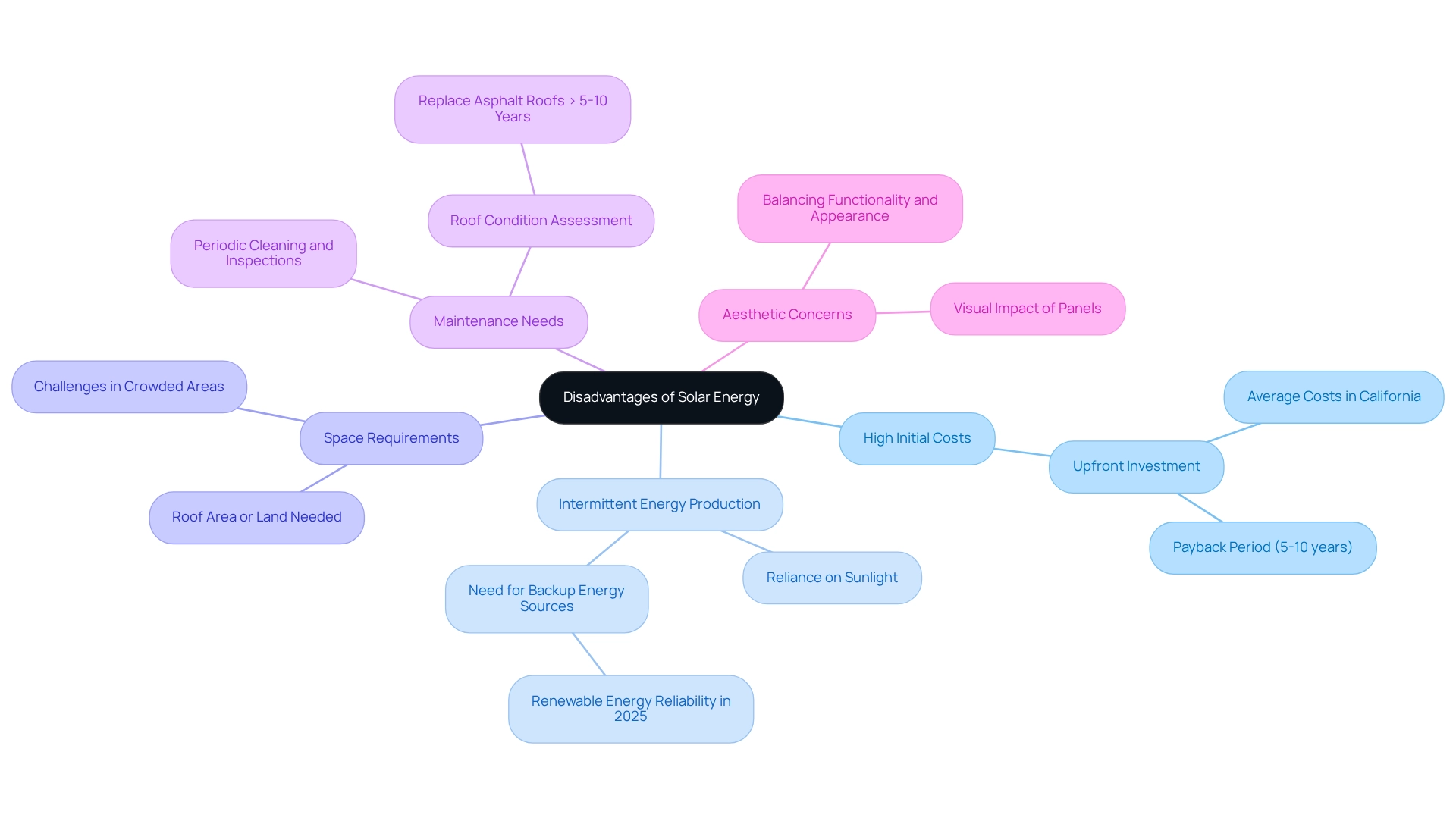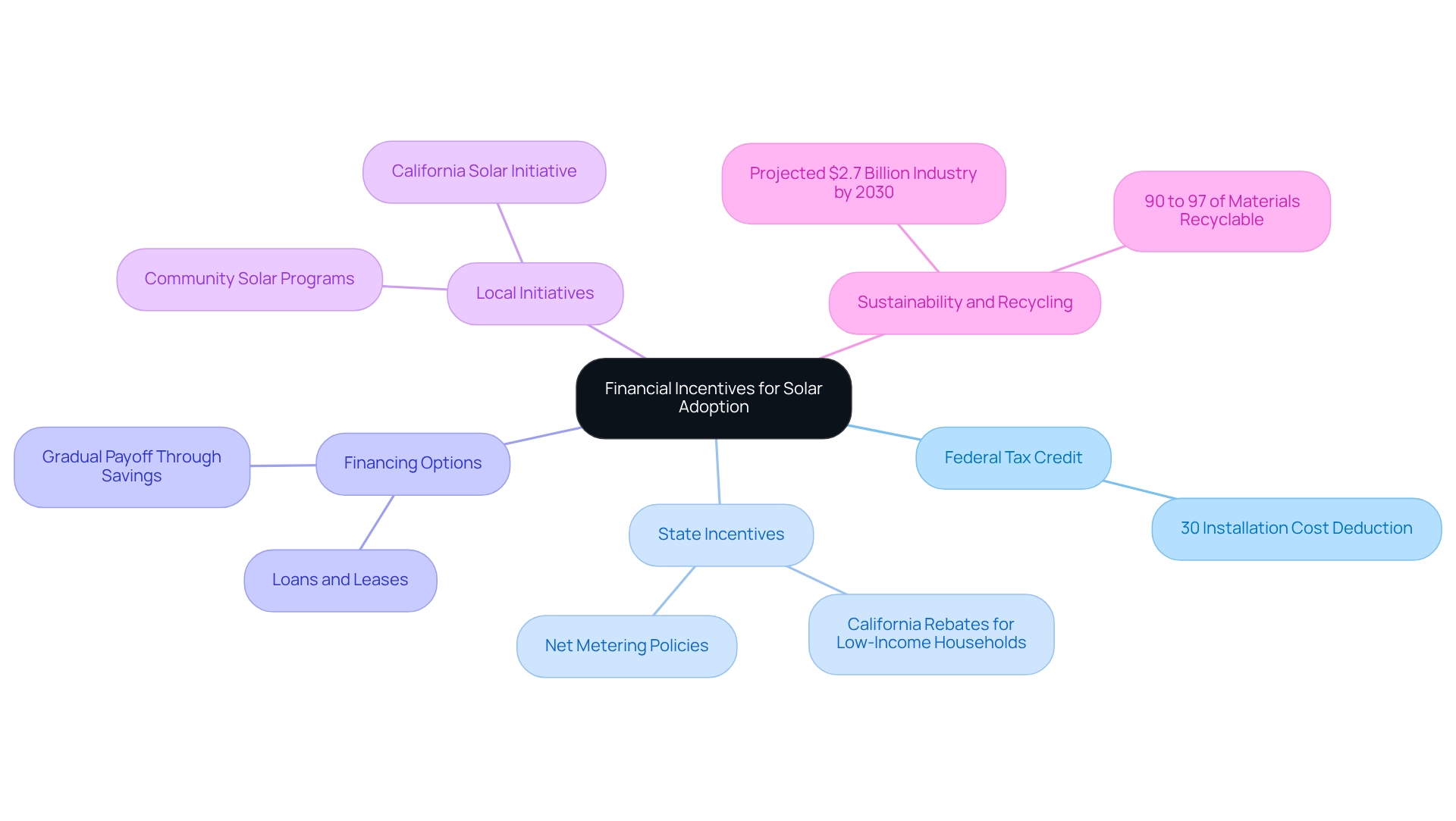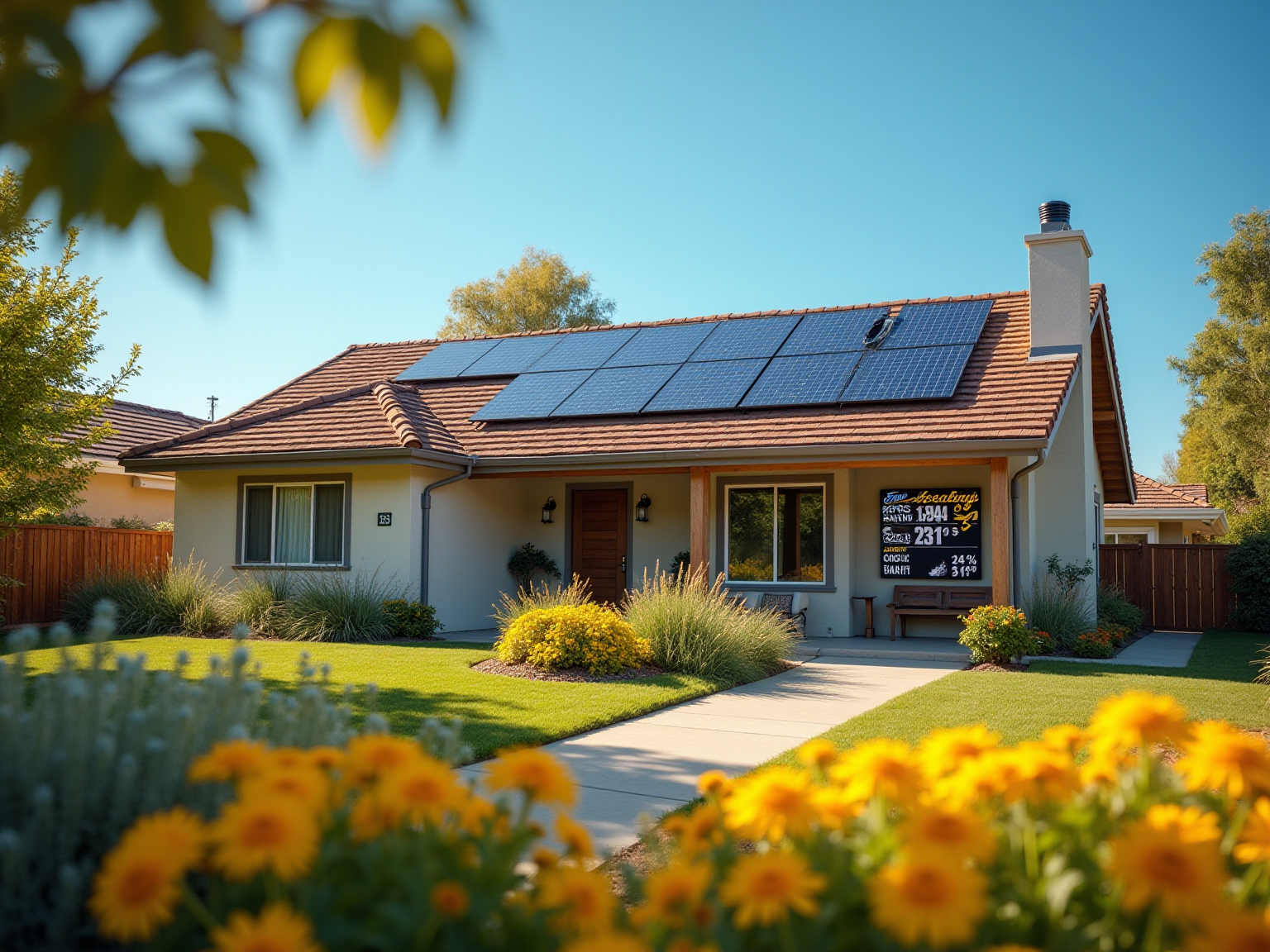Overview
We understand that rising energy bills can be a significant concern for homeowners who care about both their finances and the environment. Solar energy offers a compassionate solution, providing not only cost savings on utility bills but also increased energy independence and a reduced carbon footprint. Imagine the relief of knowing you have control over your energy sources while contributing positively to our planet.
The benefits of solar energy are profound and far-reaching. By investing in solar solutions, you can take advantage of financial incentives that lighten the burden on your wallet. Homeowners just like you have shared substantial savings, illustrating how this transition not only supports your budget but also promotes environmental sustainability. Together, we can shift towards renewable energy sources that benefit us all.
It’s common to feel overwhelmed by the options available, but remember, you are not alone in this journey. We are here to provide guidance and support every step of the way. Let’s work towards a brighter, more sustainable future together. If you’re ready to explore how solar energy can transform your home and lifestyle, we encourage you to reach out. Together, we can make a meaningful impact.
Introduction
As you navigate the pressing challenges of rising energy bills and the urgent need for sustainable solutions, solar energy stands out as a beacon of hope. By harnessing the sun’s abundant power, you not only gain access to a clean and renewable energy source but also unlock significant economic benefits for your home. With the latest advancements in technology and a growing array of financial incentives, the appeal of solar energy is more compelling than ever. Imagine substantial savings on your energy bills and an increase in your property value—these advantages are not just possibilities; they are within your reach.
We understand that making the switch to solar can feel daunting. You might be concerned about initial costs, space requirements, or how it will look on your home. These are common feelings, and it’s important to address them. This article invites you to explore the multifaceted world of solar energy, delving into its importance and benefits, while also highlighting the financial support available to those ready to embrace a greener future. Together, we can pave the way toward energy independence and a more sustainable lifestyle.
Define Solar Energy and Its Importance
We understand that energy bills can be a significant concern for many homeowners. Radiant power, the light emitted from the sun, offers a promising solution through technologies such as photovoltaic (PV) panels and thermal systems. This renewable power source plays a crucial role in combating climate change, generating electricity without emitting greenhouse gases.
In California, the use of sunlight power has seen substantial growth, with recent reports indicating that only 25% of installers noted a rise in demand in 2024. This reflects a growing trend among eco-conscious homeowners seeking sustainable alternatives to fossil fuels, illustrating what are solar energy advantages, including decreased dependence on non-renewable resources and enhanced energy autonomy.
As the demand for clean power solutions rises, sunlight-based resources emerge as a vital component in promoting environmental sustainability while demonstrating what are solar energy advantages, such as reducing overall utility expenses for households. By embracing solar energy, homeowners can save on their utility bills and actively contribute to a greener future, which demonstrates what are solar energy advantages, all while reducing their carbon footprint.
Many homeowners have shared their experiences of substantial savings and even earnings by selling excess power back to the grid, as highlighted in various case studies. For instance, a home in Southern California achieved a remarkable reduction in their utility costs—over 70%—after installing a water heating unit. This setup not only provided significant savings but also supported their sustainability efforts by minimizing their carbon footprint.
Moreover, advancements in photovoltaic technology continue to enhance efficiency and affordability, making this renewable resource an increasingly appealing choice for those dedicated to eco-friendly practices.
Additionally, homeowners can take advantage of various incentives and rebates for photovoltaic installations, which further enhance the financial appeal of these systems. Experts emphasize the essential role of sunlight power in addressing climate change. As Ben Zientara, a policy analyst with extensive experience in the residential renewable sector, observes, ‘The shift to photovoltaic power is crucial for decreasing greenhouse gas emissions and attaining a sustainable power future.’
With its myriad advantages, renewable resources are not just a trend; they represent an essential step toward a more sustainable and resilient power landscape for eco-conscious homeowners. Together, let’s explore what are solar energy advantages and how they can help you harness the power of the sun to not only reduce your energy costs but also contribute to a healthier planet. Are you ready to make a change?
Explore the Key Advantages of Solar Energy
Explore the Key Advantages of Solar Energy
We understand that rising electricity bills can be a significant concern for homeowners. Fortunately, there are solar energy advantages that provide a pathway to not just savings but a brighter future. Here are some key advantages; specifically, what are solar energy advantages:
- Cost Savings: Imagine significantly reducing your electricity bills. In California, average yearly savings can reach around $1,500 after installing photovoltaic panels, making it a financially wise investment. Additionally, utility providers and state initiatives provide financial incentives for clients to set up photovoltaic installations, such as rebates. For instance, in Oregon, rebates can go up to $5,000 for home photovoltaic installations, making renewable power more accessible and affordable. Moreover, case studies show that households in Southern California have achieved over 70% decreases in utility costs by utilizing water heating systems, which raises the question: what are solar energy advantages, especially considering its potential for substantial savings and its environmental impact as a clean, renewable resource that significantly reduces carbon emissions and air pollution? By harnessing renewable energy sources, households can lower their carbon footprints, promoting a healthier planet and supporting sustainability initiatives, illustrating what are solar energy advantages. For example, sunlight-powered air heaters can reduce a household’s carbon emissions by 20 to 40 percent, further emphasizing the environmental benefits of renewable energy technologies.
- Power Independence: It’s common to feel anxious about fluctuating power costs. Producing your own electricity allows homeowners to lessen their dependence on the grid, highlighting what are solar energy advantages in enhancing power security. Active thermal heating systems, which consist of liquid setups using water or antifreeze and air setups circulating heated air, are especially suitable for homes needing steady warmth, enabling effective management of energy requirements, illustrating what are solar energy advantages like increased property value. This makes them more attractive to prospective buyers in a competitive market. The increasing demand for energy-efficient residences supports this trend, as reflected in the anticipated expansion of the renewable energy sector, particularly regarding what are solar energy advantages, which can be enhanced by government incentives like tax credits and rebates that make photovoltaic installations more affordable. For example, initiatives in California can significantly reduce installation expenses, enhancing the economic advantages of switching to renewable power. Powercore Electric, with its local expertise and commitment to quality craftsmanship, ensures that homeowners receive tailored solutions that maximize these incentives.
As we look to the future, the global photovoltaic sector is expected to grow from $189.5 billion in 2022 to $607.8 billion by 2030, with a yearly growth rate of 20%. This momentum behind renewable power adoption emphasizes its feasibility as a sustainable power solution. Together, we can embrace this change. So, assuming a reasonably sunny roof, yes – photovoltaic systems are more than worthwhile due to the savings and incentives associated with them.
Examine the Disadvantages of Solar Energy
While sunlight power offers a variety of benefits, it’s important to discuss what are solar energy advantages along with several drawbacks that may concern you:
- High Initial Costs: The upfront investment for photovoltaic panels and installation can indeed be substantial, with average expenses in California reaching upwards of $15,000 to $25,000. Although these costs can be reduced by long-term savings on utility bills, the initial financial burden remains a significant consideration for many homeowners. The payback period for solar panels typically ranges from 5 to 10 years, depending on factors like utility rates and electricity consumption. This provides a clearer financial context for potential investors, helping you make informed decisions.
- Intermittent Energy Production: Solar power generation is inherently reliant on sunlight, leading to variability in power production. In California, while the state enjoys abundant sunshine, cloudy days and nighttime can interfere with power generation. Statistics indicate that renewable energy production reliability in California for 2025 will still necessitate dependable backup energy sources to ensure a continuous power supply.
- Space Requirements: Sufficient roof area or land is essential for panel installation. Homeowners with restricted roof space or those residing in crowded areas may find it challenging to install the required energy infrastructure.
- Maintenance Needs: Although photovoltaic systems typically require minimal upkeep, they do need periodic cleaning and inspections to maintain optimal performance. It’s wise for property owners to assess the state of their roofs prior to installation; substituting asphalt roofs that are over 5 to 10 years old is frequently suggested to prevent issues during the panel installation procedure. Neglecting these tasks can lead to decreased efficiency over time.
- Aesthetic Concerns: The visual effect of photovoltaic panels can be a hindrance for certain property owners. While many appreciate the functional benefits, others may find the appearance of energy installations unattractive. However, it’s important to recognize that many property owners value the long-term savings and energy autonomy that photovoltaic technology offers, which can help address these aesthetic concerns.
In addition to these challenges, it’s worth mentioning that thermal heating solutions, whether active or passive, can significantly improve energy efficiency in residences. These setups not only provide economic advantages by decreasing utility costs but also illustrate what are solar energy advantages by minimizing greenhouse gas emissions for a more sustainable way of living. Case studies show that investing in rooftop energy systems enables residents to pre-purchase electricity at a fixed rate, effectively protecting them from increasing utility expenses. This strategic action not only improves autonomy in power sources but also aids in long-term savings. Together, we can explore these options and find a solution that works for you.

Understand Financial Incentives and Support for Solar Adoption
For homeowners concerned about rising energy bills, understanding what are solar energy advantages and the financial motivations behind energy adoption is vital. You might be wondering how to make renewable energy more accessible and affordable. Here are some key incentives that can help you on this journey:
- Federal Tax Credit: The Residential Clean Energy Credit allows you to deduct 30% of the installation costs of photovoltaic systems from your federal taxes. This significantly reduces the overall expense of embracing renewable energy.
- State Incentives: In California, various state-level incentives, including rebates and grants, specifically aim to support low-income households in accessing renewable energy technology. These programs are designed to make clean power more reachable and economical for everyone, illustrating what are solar energy advantages, including policies like Net Metering that allow you to sell excess power generated by your photovoltaic systems back to the grid. This not only leads to additional savings on your utility bills but also promotes a more sustainable energy ecosystem.
- Financing Options: You can explore a range of financing solutions, such as loans and leases, which facilitate the installation of energy systems with minimal upfront costs. This approach allows you to gradually pay off your investment through the savings you accumulate on your utility bills.
- Local Initiatives: Many local authorities and utilities have launched specific programs to encourage renewable energy use. For example, community initiatives enable residents to benefit from solar power without needing to install panels on their properties, broadening access to clean resources. Additionally, programs like the California Solar Initiative offer financial incentives for homeowners who install photovoltaic systems, showcasing what are solar energy advantages in further supporting the transition to renewable energy. When it comes to costs, photovoltaic panels can significantly reduce your electricity expenses over time compared to traditional energy sources. Powercore Electric is here to provide tailored energy solutions that not only help you take advantage of these financial incentives but also ensure you receive the best pricing options available.
Moreover, the panel recycling industry is gaining traction, with projections estimating it could reach a value of $2.7 billion by 2030. Barry Elad, a senior writer, notes that about 90% to 97% of photovoltaic materials are recyclable and can be repurposed when they reach the end of their lifecycle. This highlights the importance of sustainability in the energy sector. As the market evolves, it is crucial for environmentally conscious homeowners to understand what are solar energy advantages in order to make renewable energy a viable option. Ben Zientara, a solar policy analyst, emphasizes that these incentives not only lower costs but also foster a shift toward sustainable energy practices.
We understand that making the switch to renewable energy can feel overwhelming, but together we can navigate these options and find the best solutions for your home. Let’s work towards a more sustainable future, one step at a time.

Conclusion
We understand that the rising costs of energy bills can be a significant concern for many homeowners. Embracing solar energy offers a transformative path toward both financial savings and environmental sustainability. By transitioning to solar, you can enjoy substantial cost savings on electricity bills, reduced carbon emissions, and even increased property values. With various financial incentives, such as federal tax credits and state rebates, making the switch to solar has become more accessible than ever, presenting an attractive option for those seeking to lower their energy costs while contributing to a greener future.
However, it’s common to feel apprehensive about the challenges associated with solar energy, such as high initial costs, intermittent energy production, and space requirements. Despite these obstacles, the long-term benefits of solar energy—ranging from energy independence to enhanced property value—far outweigh the drawbacks. As technology continues to advance and the market expands, the potential for solar energy to play a pivotal role in achieving a sustainable energy future becomes increasingly apparent.
Ultimately, the shift toward solar energy is not just a personal investment; it is a collective step toward a more sustainable world. By taking advantage of available incentives and addressing concerns about installation, homeowners can play a crucial role in the transition to renewable energy. Together, we can embark on this journey toward energy independence and a greener lifestyle, which is not only possible but also within reach. Solar energy is a vital component of a sustainable future for all, and we are here to support you every step of the way.


